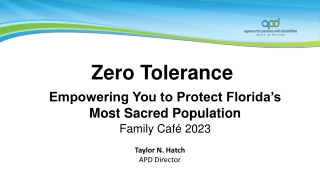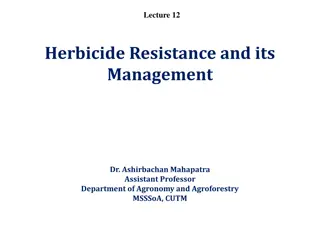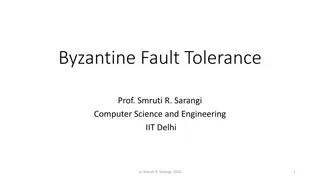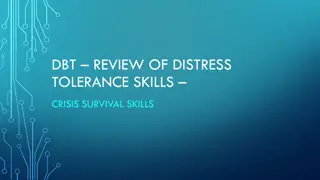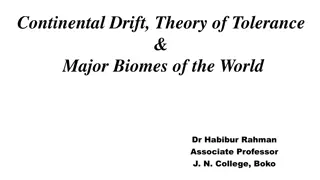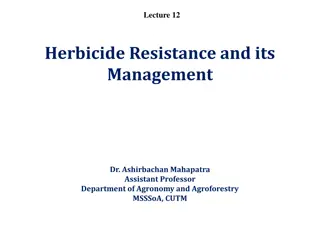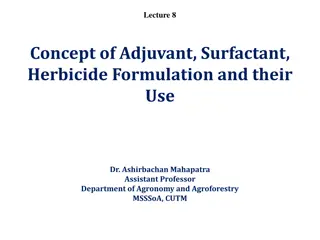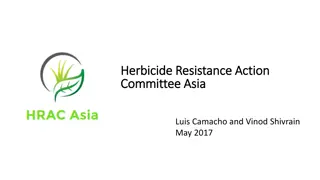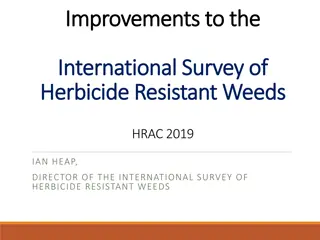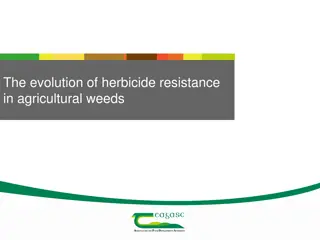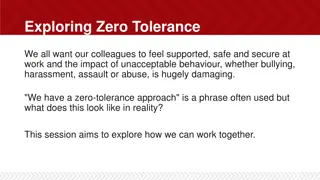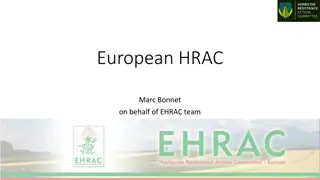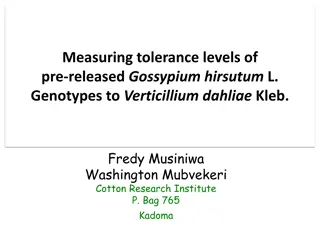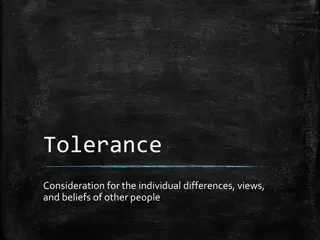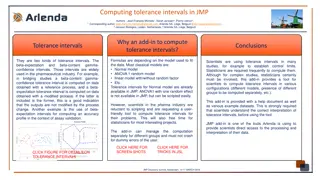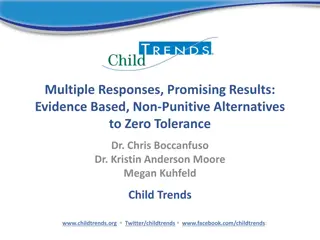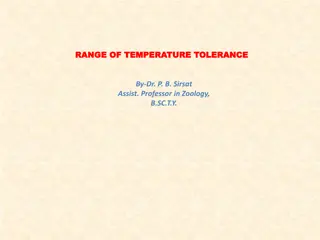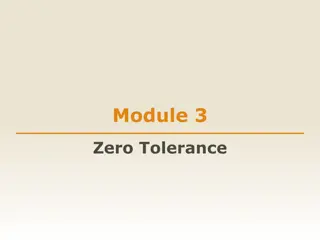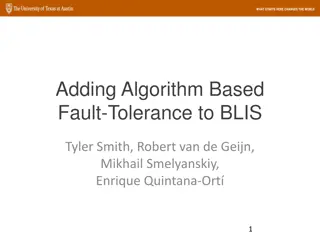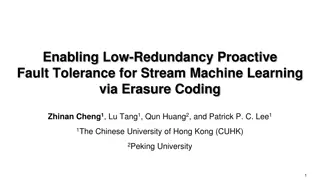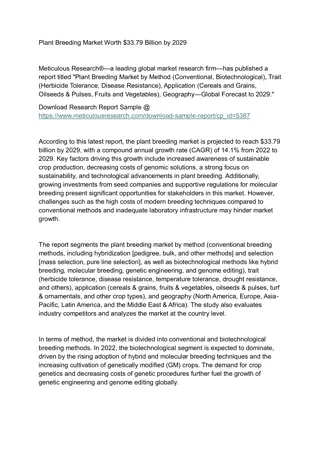Investing Strategies
Get comprehensive guidance on investing strategies, risk tolerance, and types of investors. Understand the importance of setting investment goals and managing emotions while investing. Learn how to assess your risk tolerance and make informed investment decisions for a secure financial future. Popu
2 views • 36 slides
Zero Tolerance Initiative: Protecting Florida's Vulnerable Populations
The Agency for Persons with Disabilities (APD) in Florida is dedicated to supporting individuals with developmental disabilities and combatting abuse, neglect, and exploitation. Through their Zero Tolerance Initiative and community efforts, they aim to empower individuals to report incidents and bre
4 views • 29 slides
Professional Learning Framework for Inclusion, Wellbeing, and Equalities
Explore the Window of Tolerance and its importance in well-being and professional development within Scotland's educational landscape. This resource provides insights on regulating emotions, expanding tolerance levels, and supporting others effectively. Utilize slides for group learning or self-dire
1 views • 16 slides
Understanding Adjuvants and Herbicide Formulation in Agriculture
Adjuvants play a crucial role in enhancing the effectiveness of herbicides by aiding in wetting, spreading, and penetration of herbicides into target plants. Different types of adjuvants such as surfactants, stabilizing agents, coupling agents, humectants, and deposit builders serve specific functio
2 views • 10 slides
Understanding Herbicide Mixtures, Compatibility, and Applications in Agriculture
Herbicide mixtures play a crucial role in weed control by combining different herbicides for enhanced efficacy. Various types of herbicide mixtures, including factory pre-mix and tank mix, offer advantages such as broad-spectrum weed control and delayed resistance development. Compatibility of herbi
3 views • 23 slides
Understanding Herbicide Resistance and Management
Herbicide resistance is the inheritable ability of certain weed populations to survive herbicide treatments that would typically control them. This resistance is a natural process, influenced by factors like genetic diversity, herbicide selection pressure, and resistance mechanisms. Effective manage
12 views • 14 slides
Understanding Byzantine Fault Tolerance in Distributed Systems
Byzantine fault tolerance is crucial in ensuring the reliability of distributed systems, especially in the presence of malicious nodes. This concept deals with normal faults, crash faults, and the challenging Byzantine faults, where nodes can exhibit deceptive behaviors. The Byzantine Generals Probl
0 views • 29 slides
DBT Review of Distress Tolerance Skills & Crisis Survival Techniques
Explore DBT review of distress tolerance skills and crisis survival tactics including STOP method, pros/cons evaluation, crisis urge management, TIP technique and Wise Mind principles. Learn when to apply crisis survival skills and how they can aid in managing short-term crises effectively.
1 views • 15 slides
Exploring TOLERANCE - Artwork by Guy Ferrer
Guy Ferrer, a contemporary French/Mediterranean artist, created the TOLERANCE series to address religious tensions and promote compassion, hope, and mutual respect. Through his sculptures, Ferrer advocates for universal tolerance, emphasizing the importance of accepting different beliefs to foster h
0 views • 16 slides
Continental Drift, Theory of Tolerance & Major Biomes of the World Overview
This detailed presentation explores topics like Continental Drift, the Theory of Tolerance, and Major Biomes of the World. It covers the history of the Continental Drift theory, from Wegener to Du Toit's modifications, and delves into the various terrestrial biomes that exist, including tundra, bore
2 views • 26 slides
Understanding Autoimmunity and Immunological Tolerance
Autoimmunity is a condition where the body's immune cells mistakenly attack its own tissues, leading to damage. Immunological tolerance helps prevent this by mechanisms like central and peripheral tolerance. Central tolerance involves deleting self-reactive immune cells during maturation in key orga
1 views • 32 slides
Understanding Herbicide Resistance in Weeds: Insights and Management Strategies
Herbicide resistance is a naturally occurring phenomenon in weed populations, impacting the effectiveness of herbicide treatments. This resistance can be passed down through generations and is influenced by various factors such as cultural practices, herbicide mechanisms, and the biology of weed spe
0 views • 14 slides
Understanding Adjuvants and Herbicide Formulation
Adjuvants are additives that enhance herbicide effectiveness, crucial for optimal weed control. Types include surfactants, stabilizing agents, coupling agents, humectants, deposit builders, and more. Surfactants aid in wetting and spreading herbicides, stabilizing agents keep suspensions intact, cou
0 views • 10 slides
VELCO Vegetation Management Plan Overview 2021
Detailed analysis of the proposed vegetation management plan by VELCO for 2021, including comparisons between planned and actual units, herbicide usage by chemical and line, Rodeo usage by year, scheduled maintenance areas, and ultra-low volume foliar treatments. The data visualizations provide insi
0 views • 12 slides
Understanding Basic Hole and Shaft Systems in Manufacturing Processes
Basic Hole and Shaft Systems are essential procedures for determining mating part dimensions and tolerance information in manufacturing drawings. By knowing parameters such as Basic Size, Allowance, Hole Tolerance, and Shaft Tolerance, accurate and functional parts can be produced. This system ensur
0 views • 36 slides
Herbicide Absorption and Translocation Mechanisms in Plants
Herbicides need to be effectively absorbed and translocated within plants to interfere with physiological and biochemical processes. Soil-applied herbicides are absorbed by roots, shoots, and seeds through different mechanisms, while foliage-applied herbicides enter through the cuticle, stomata, and
0 views • 7 slides
Challenges and Trends in Herbicide Resistance Management in Asia-Pacific Region
The Asia-Pacific region faces challenges with herbicide resistance, particularly in countries like China and Australia. Issues include incorrect herbicide application, resistance cases reported, and concerns about glyphosate resistance. Additionally, the introduction of herbicide-tolerant traits in
0 views • 11 slides
Enhancements to International Survey of Herbicide Resistant Weeds and Website Overhaul Plan
In 2019, Ian Heap, Director of the International Survey of Herbicide Resistant Weeds (HRAC), is leading an initiative to enhance the survey and overhaul the website to target completion by year-end. The website will undergo a three-tiered redesign focusing on presentation layer, application layer, a
0 views • 11 slides
Understanding RAID 5 Technology: Fault Tolerance and Degraded Mode
RAID 5 is a popular technology for managing multiple storage devices within a single array, providing fault tolerance through data striping and parity blocks. This article discusses the principles of fault tolerance in RAID 5, the calculation of parity blocks, handling degraded mode in case of disk
0 views • 12 slides
Understanding Herbicide Resistance in Agricultural Weeds
This comprehensive content covers the evolution of herbicide resistance in agricultural weeds, including the origins of herbicides, cases of resistance, target site resistance, and non-target site resistance. It explains the definition of weeds, types of herbicides, selective and non-selective herbi
0 views • 32 slides
Understanding Religious Tolerance in Schools: Insights from Research
Exploring the levels of religious tolerance among students in different types of schools such as Roman Catholic, Evangelical Christian, Muslim, and Non-Faith institutions. The research considers factors influencing students' attitudes towards diversity and highlights varying levels of active toleran
0 views • 15 slides
Exploring Zero Tolerance: Creating a Safe and Supportive Workplace
This session aims to delve into the concept of zero tolerance towards unacceptable behaviors such as bullying, harassment, assault, and abuse in the workplace. It discusses prevention, protection, response strategies, and feedback mechanisms to ensure a supportive and secure environment for all empl
0 views • 5 slides
Global Herbicide Resistance Action Committee (HRAC): Protecting Crop Yields Worldwide
The Global Herbicide Resistance Action Committee (HRAC) is a global leader in managing herbicide resistance to safeguard crop yields and quality. They focus on collecting, assessing, and providing vital information to combat herbicide resistance. Their mission is to support industry experts working
0 views • 12 slides
United States Herbicide Resistance Action Committee Summary
Herbicide resistance is a critical issue being tackled by the United States Herbicide Resistance Action Committee (US HRAC). Formed in 2015, US HRAC operates independently from Global HRAC, focusing on specific areas while aligning on key herbicide resistance matters. The committee engages in variou
0 views • 6 slides
Byzantine Fault Tolerance: Protocols, Forensics, and Research
Explore the realm of Byzantine fault tolerance through protocols like State Machine Replication and HotStuff, discussing safety, liveness, forensic support, and the impact of Byzantine faults. Dive into decades of research on achieving fault tolerance and examining forensic support in the face of By
0 views • 24 slides
European HRAC - Herbicide Resistance Action Committee
European HRAC, led by Marc Bonnet, is a group of industry experts working on herbicide resistance issues. The team includes members from various companies and focuses on leveraging their collective knowledge to address resistance challenges. Their SWOT analysis highlights strengths, weaknesses, oppo
0 views • 7 slides
Advancing Rice Breeding Partnerships in Myanmar: Current Progress and Future Prospects
The collaborative efforts between IRRI and Myanmar in rice breeding have been fruitful since 1965, with numerous rice varieties released in Myanmar having IRRI lineage. The focus is on developing appropriate rice varieties for different regions to ensure rice yield stability. Target traits for delta
1 views • 17 slides
Tolerance Levels of Gossypium hirsutum L. Genotypes to Verticillium dahliae Kleb.
The study aims to measure the tolerance levels of pre-released Gossypium hirsutum L. genotypes to Verticillium dahliae Kleb, a soil-borne fungus causing Verticillium wilt in cotton. The research, conducted at the Cotton Research Institute, focuses on determining tolerance levels of new cotton genoty
0 views • 18 slides
Understanding Organizational Risk Appetite and Tolerance
Explore the development of market risk appetite goals and how to define and establish organizational risk tolerance. Learn about the Classic Simplified View of Risk Tolerance and different methods to determine risk appetite. Discover the importance of assessing market risk impact and aligning risk t
0 views • 8 slides
Exploring Tolerance: Understanding and Practicing Consideration
Tolerance involves considering and respecting the individual differences, views, and beliefs of others, even when they differ from our own. This concept emphasizes the importance of listening, understanding, and appreciating diverse perspectives. Active listening exercises and starter questions help
0 views • 20 slides
Fault-Tolerant MapReduce-MPI for HPC Clusters: Enhancing Fault Tolerance in High-Performance Computing
This research discusses the design and implementation of FT-MRMPI for HPC clusters, focusing on fault tolerance and reliability in MapReduce applications. It addresses challenges, presents the fault tolerance model, and highlights the differences in fault tolerance between MapReduce and MPI. The stu
1 views • 25 slides
Computing Tolerance Intervals in JMP: An Add-In for Efficient Data Analysis
Tolerance intervals play a crucial role in statistical analysis, especially in industries like pharmaceuticals. This article introduces an add-in in JMP for computing tolerance intervals, highlighting the significance of understanding and interpreting these intervals correctly. The tool aims to simp
0 views • 4 slides
Evidence-Based Alternatives to Zero Tolerance Policies
Zero tolerance policies in schools have not shown clear effectiveness and are associated with negative outcomes for students. Suspensions and expulsions linked to zero tolerance can lead to disconnection from school, risky behavior, poor academic achievement, and entry into the school-to-prison pipe
0 views • 22 slides
Temperature Tolerance of Organisms in the Universe
Life on Earth exists within a range of temperatures, with organisms displaying varied temperature tolerance. Eurythermal organisms can withstand large temperature fluctuations, while stenothermal organisms tolerate only small variations. The temperature range for each species is crucial for their ph
0 views • 8 slides
Understanding the Effects of Air Gap Tolerance on Inductance Tolerance
This technical note delves into the impact of air gap tolerance on inductance tolerance in transformer manufacturing. It explains how controlling the core's air gap dimension is crucial for maintaining desired inductance levels within manufacturing constraints. The text discusses the small scale of
1 views • 10 slides
Ensuring Zero Tolerance Towards Sexual Abuse and Harassment
This module outlines a zero-tolerance policy towards all forms of sexual abuse and harassment within a certain agency, emphasizing the importance of thorough investigation into complaints. It also includes a group activity where participants discuss strategies for communicating the zero-tolerance me
0 views • 5 slides
Enhancing Fault Tolerance in BLIS with Algorithm-Based Techniques
Addressing the challenge of soft errors in supercomputers, this paper introduces algorithm-based fault tolerance methods to enhance the resilience of systems like BLIS. By integrating Application-Based Fault Tolerance (ABFT) into BLIS, the study aims to improve error detection and correction mechani
0 views • 48 slides
Low-Redundancy Proactive Fault Tolerance for Stream Machine Learning
This study focuses on enabling fault tolerance for stream machine learning through erasure coding. Fault tolerance is crucial in distributed environments due to worker failures, and existing approaches like reactive fault tolerance and proactive replication have drawbacks. The use of erasure coding
0 views • 20 slides
Understanding the Impact of Water Quality on Herbicide Efficacy
Water quality plays a crucial role in determining the effectiveness of herbicides. Factors such as water pH, hardness, turbidity, and dissolved materials can influence herbicide efficacy. The interaction between water chemistry and herbicide chemistry is essential for successful applications. Differ
0 views • 13 slides
Plant Breeding Market
\nPlant Breeding Market by Method (Conventional, Biotechnological), Trait (Herbicide Tolerance, Disease Resistance), Application (Cereals and Grains, Oilseed & Pulses, Fruits and Vegetables), Geography - Global Forecast to 2029
1 views • 3 slides

